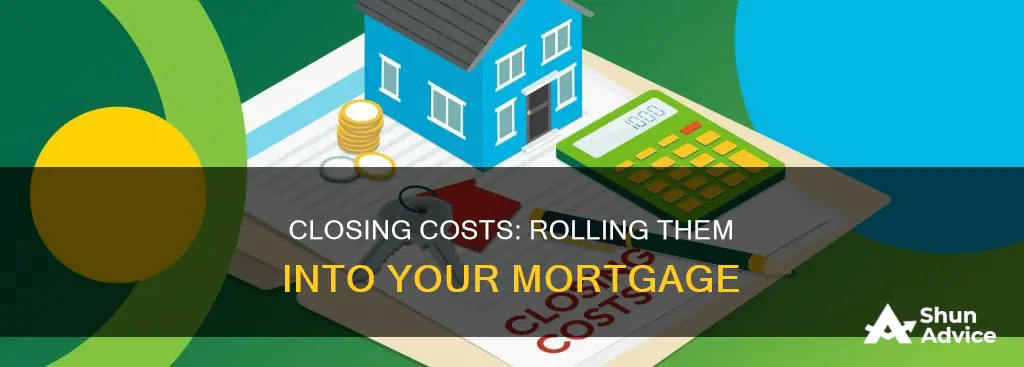
There are several options available to those who are unable to pay closing costs upfront. One option is to roll the closing costs into the mortgage loan, which is also known as financing your closing costs. However, this option comes with certain downsides. By rolling the closing costs into the loan, you will end up paying more interest over the life of the loan. This is because you will be paying interest on the closing costs in addition to the interest for the cost of the home loan.
| Characteristics | Values |
|---|---|
| Possibility | Yes, it is possible to roll closing costs into your mortgage. |
| Lender | Not all lenders allow rolling closing costs into the mortgage. |
| Interest | You will have to pay interest on the closing costs over the life of the loan. |
| Loan amount | The loan amount may increase and take longer to pay off. |
| Loan type | The possibility of rolling closing costs into the mortgage depends on the loan type. For instance, on Department of Veterans Affairs (VA) loans, the funding fee is the only closing cost that can be rolled into a VA loan. |
| Loan program | The possibility of rolling closing costs into the mortgage depends on the loan program. For example, some FHA closing costs (like prepaid MIP) are tacked onto the mortgage balance. |
| Loan-to-value ratio | Rolling closing costs into the mortgage can increase the loan-to-value ratio, leading to less equity and potentially requiring private mortgage insurance. |
| Debt-to-income ratio (DTI) | Rolling closing costs into the mortgage can increase the DTI, making it challenging to secure other loans. |
| Closing cost amount | Closing costs are typically 2% to 5% of the purchase price of a home. |
| Seller | In a buyer's market, you can negotiate to have the seller pay the closing costs. |

Pros and cons
There are several advantages and disadvantages to rolling closing costs into your mortgage.
Pros
- You won't have to deplete your cash reserves to buy a home, and you can use the funds to meet other financial needs and goals.
- You can use the funds you had for the closing to pay down debt, improve your debt-to-income ratio (DTI) and potentially increase your credit score to get a better rate on your home loan.
- You can buy a home sooner without having to wait until you've saved for closing costs on top of the down payment.
- You won't have to scramble to come up with the funds needed to seal the deal.
Cons
- You will pay more in interest over the loan term since you have to take out a larger mortgage.
- By adding the closing costs to your new mortgage balance, you are increasing the loan-to-value ratio (LTV). Increasing the LTV lowers the amount of equity in your home. Less equity means less profit when you sell your home because you'd have a bigger lien to pay off after the sale. You would also have less equity if you wanted to take a home equity loan.
- In some instances, you may have to pay private mortgage insurance that could add a few hundred dollars to your monthly mortgage payment.
Removing Deceased Spouse from Mortgage: What You Need to Know
You may want to see also

How to negotiate
Negotiating closing costs can be a complex process, and it's important to understand which costs are flexible and which are fixed. While some fees are set in stone, such as state and federal taxes, others can be reduced or waived. Here are some key strategies to help you negotiate closing costs effectively:
Understanding the Fees: Familiarize yourself with the various fees associated with closing a mortgage. These can include origination fees, application fees, processing fees, and more. Knowing what each fee entails will empower you to identify areas where you can negotiate and save money.
Comparing Lender Offers: Don't hesitate to shop around for different lenders and compare their offers. Lender fees can vary significantly, and exploring multiple options can help you find the most competitive rates and potentially save on closing costs. Request loan estimate forms from different lenders to make an informed decision.
Negotiating with the Seller: In some cases, you may be able to negotiate with the seller to cover a portion of the closing costs. This is more common in a buyer's market, but it's worth discussing with the seller or their agent. You could propose offering a higher price in exchange for their contribution to the closing costs, essentially rolling those costs into the mortgage.
Exploring Lender Credits: Lender credits allow you to pay a higher interest rate on your mortgage in exchange for a reduction or elimination of the closing costs. Be cautious, as this option might lead to higher overall costs in the long run. Not all lending programs permit seller concessions, so ensure you understand the terms.
Taking Advantage of Assistance Programs: Research down payment and closing cost assistance programs offered by local, state, and federal agencies. These programs are often designed to support first-time homebuyers and can provide significant financial relief. The Federal Housing Administration (FHA) also offers down payment assistance programs if you need help with the initial payment.
Negotiating with Your Lender: Don't be afraid to negotiate directly with your lender. Ask if they are willing to reduce or waive certain fees, as some lenders may offer incentives to attract borrowers. Be transparent about your budget constraints, as they may be able to provide solutions or suggest alternative options to lower your closing costs.
Remember, while negotiating closing costs can result in significant savings, it's important to understand the limitations and potential trade-offs. Some costs are simply outside your control, and attempting to negotiate everything may not be fruitful. Focus your efforts on the fees that are flexible and use your negotiating skills strategically.
Researching Mortgage Records: Palm Beach County Guide
You may want to see also

Lender requirements
Some lenders offer what is referred to as a "no-closing cost mortgage" or a "no-cost refinance". These home loans come with a lender credit that covers closing costs. However, you can expect higher borrowing costs if you wish to take out this type of mortgage. For example, lenders may offset the absence of upfront closing costs by increasing the total loan amount or implementing a higher interest rate.
FHA loans, for instance, allow closing costs to be rolled into the loan, along with seller concessions of up to 6% of the loan amount to lower the amount the borrower needs to finance. VA loans also allow borrowers to roll the one-time funding fee into the home loan. However, for a USDA loan, the home value per the appraisal must exceed the sales price to be eligible for closing cost refinancing.
The decision to roll closing costs into a mortgage also depends on the borrower's financial situation and goals. If a borrower has the funds to pay the closing costs upfront, they can borrow less, get a slightly lower monthly payment, and save on interest over the life of the loan. On the other hand, if a borrower needs extra money in their pocket, rolling closing costs into the loan may be a good decision, as it may help them buy a home sooner.
Researching Mortgages: A Step-by-Step Guide to Getting Started
You may want to see also

Mortgage types
There are several mortgage types that allow you to roll closing costs into the loan. Here are some options:
FHA Loans
FHA loans are a popular choice for homebuyers as they offer flexible requirements and low down payments. With an FHA loan, you can typically roll the upfront mortgage insurance premium, which is usually 1.75% of the loan amount, into the loan. Additionally, other closing costs associated with FHA loans may also be rolled into the loan, depending on your specific situation. Keep in mind that FHA loans have certain requirements, such as a minimum down payment of 3.5%, excluding closing costs.
VA Loans
VA loans are designed specifically for military service members, veterans, and their families. With a VA loan, you can finance the VA funding fee, which is paid directly to the Department of Veterans Affairs. The amount of the funding fee varies based on your military service history and whether it is your first VA loan. Some borrowers are even exempt from paying the funding fee altogether. While other closing costs typically need to be paid at closing, the VA loan program limits what closing costs buyers are responsible for, and you may be able to get a VA loan with 0% down.
USDA Loans
If you are purchasing a home in a rural or suburban area, you may be eligible for a USDA loan. With a USDA loan, you can roll the closing costs into your loan if the house appraises above the purchase price. This option is particularly useful if you are looking to buy a home in eligible locations and meet the income requirements.
Seller Credit or Lender Credit
Another way to effectively roll closing costs into your mortgage is by utilising a seller credit or lender credit. A seller credit involves negotiating with the seller to pay the closing costs, typically by offering a higher price for the property. Alternatively, you can speak to your lender about a lender credit, where they agree to pay the closing costs in exchange for a higher interest rate on your loan. This option increases your overall costs but allows you to avoid paying the closing costs out of pocket.
Refinancing
If you are refinancing an existing home loan, it is often possible to include closing costs in the new loan amount. As long as adding the closing costs does not significantly impact your debt-to-income (DTI) ratio or loan-to-value (LTV) ratio, you should be able to roll them into the refinance. However, exceeding certain thresholds, such as 80% LTV, may require you to purchase private mortgage insurance, increasing your overall costs.
Missouri Mortgage Recording: A Step-by-Step Guide
You may want to see also

Long-term costs
While rolling closing costs into your mortgage loan can provide short-term financial relief, it is important to carefully consider the long-term costs. By rolling closing costs into your loan, you will be increasing the total amount you pay for your home in the long run. This is because you will be paying interest on those costs over the loan's lifetime, resulting in higher monthly payments compared to a loan where you pay closing costs upfront. In most cases, paying closing costs upfront will result in paying less for the loan overall.
Additionally, rolling closing costs into your loan can increase your loan-to-value ratio, which means less equity and often, the requirement to pay private mortgage insurance. It can also increase your DTI (debt-to-income) ratio, which may make it more difficult to secure other loans in the future.
The decision to roll closing costs into your mortgage depends on your specific financial situation and goals. If you don't have the cash on hand to cover closing costs upfront, rolling them into your mortgage can be a worthwhile option. However, if you have the funds available, it is usually more advantageous to pay the closing costs upfront to minimize interest payments and build equity in the short term.
It is also worth noting that not all lenders allow you to roll closing costs into your mortgage, and the rules can vary depending on the type of mortgage and the specific program. Some programs do not permit this as it can affect your DTI ratio. Therefore, it is important to do your research, understand your options, and carefully consider the long-term financial implications before making a decision.
Releasing a Recorded Mortgage in New Jersey
You may want to see also
Frequently asked questions
Yes, it is possible to roll closing costs into your mortgage. However, not all lenders allow this and the rules vary depending on the type of mortgage.
Rolling closing costs into your mortgage can provide short-term financial relief as you won't need to pay a large sum upfront at closing. This option may be beneficial if you are a first-time homebuyer or prefer to maintain your savings.
By rolling closing costs into your mortgage, you will pay interest on those costs over the life of the loan, which will increase the total amount you pay for your home in the long run. It may also increase your DTI ratio, making it more difficult to secure other loans.
You can negotiate with the seller to cover some or all of the closing costs. Alternatively, you can ask your lender about a lender credit, where they will pay the closing costs in exchange for a higher interest rate.







